Australia-India Business: Socio-Cultural Implications for Managers
VerifiedAdded on 2023/04/21
|16
|5273
|291
Essay
AI Summary
This essay examines the socio-cultural implications for managers conducting business between Australia and India, using Wesfarmers Corporation as a case study. It highlights the relevance of socio-cultural factors like culture, language, changing preferences, and demographics in shaping business strategies. The analysis covers Wesfarmers' strategic development, CSR activities, PESTLE analysis, and Porter’s five forces. It emphasizes the importance of understanding cultural nuances, adapting to changing consumer preferences, and maintaining a healthy work environment. The essay concludes with recommendations for future strategic development, focusing on leveraging cultural understanding and stakeholder engagement for sustained success. Desklib provides students access to similar past papers and solved assignments for enhanced learning.
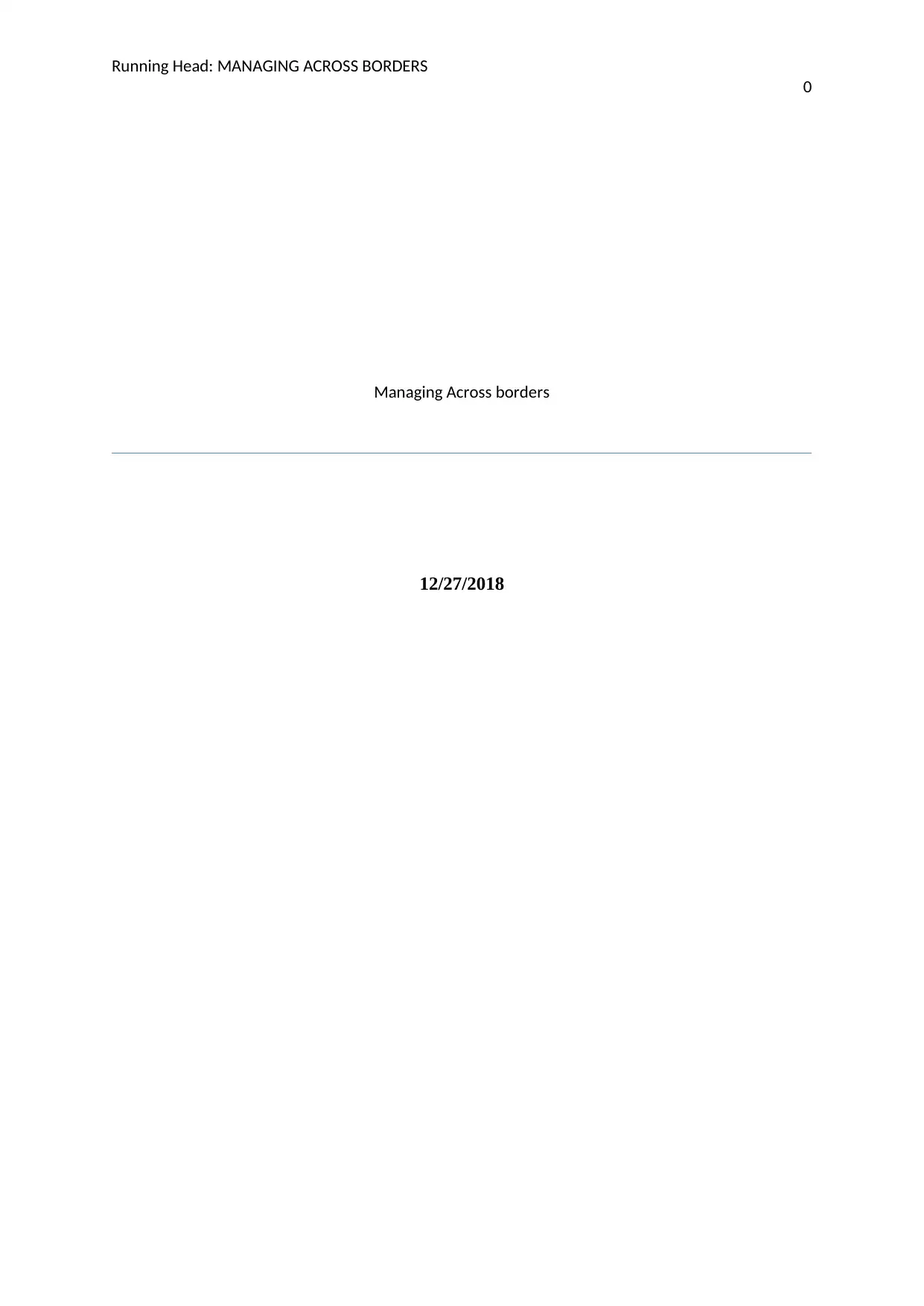
Running Head: MANAGING ACROSS BORDERS
0
Managing Across borders
12/27/2018
0
Managing Across borders
12/27/2018
Paraphrase This Document
Need a fresh take? Get an instant paraphrase of this document with our AI Paraphraser
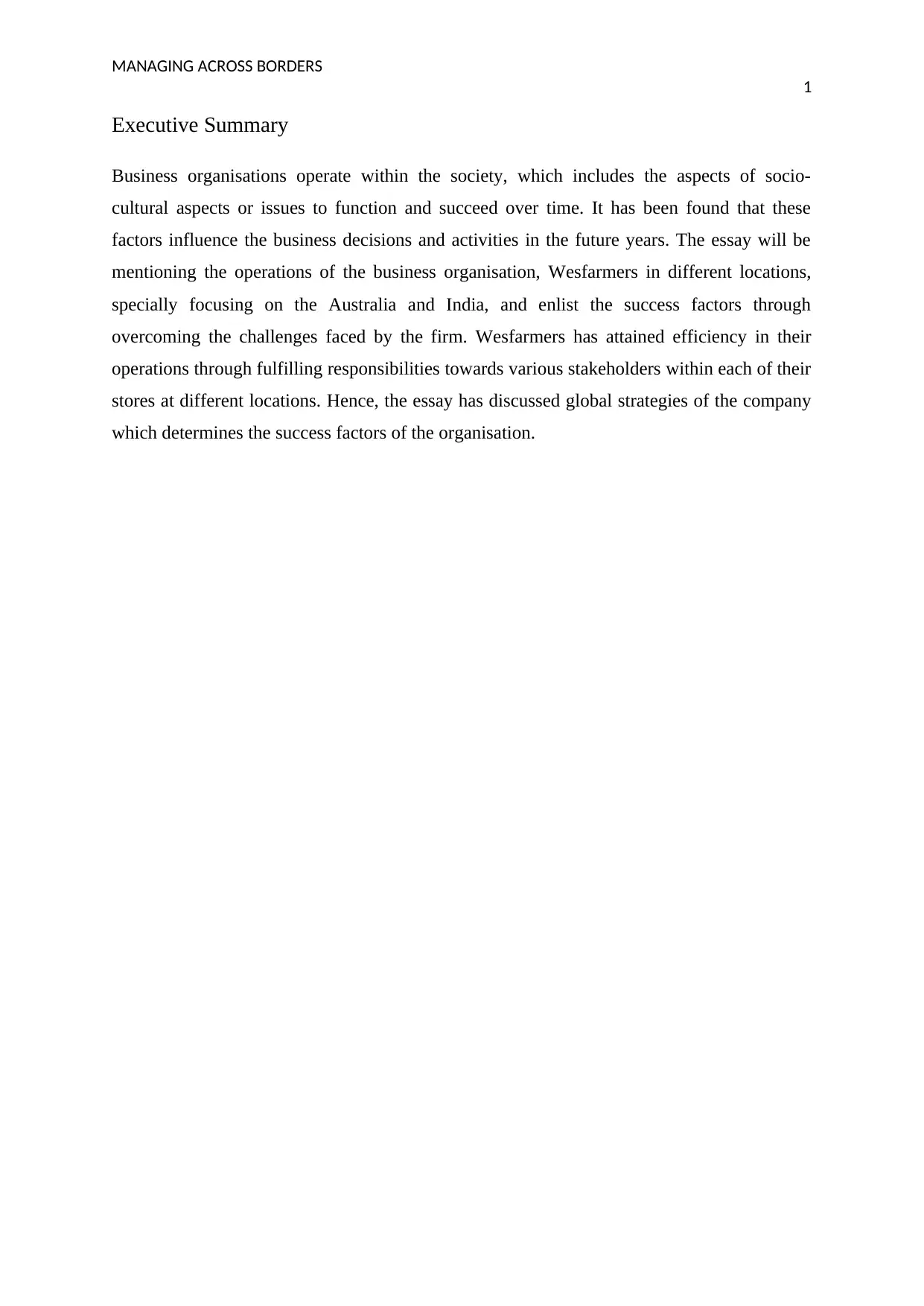
MANAGING ACROSS BORDERS
1
Executive Summary
Business organisations operate within the society, which includes the aspects of socio-
cultural aspects or issues to function and succeed over time. It has been found that these
factors influence the business decisions and activities in the future years. The essay will be
mentioning the operations of the business organisation, Wesfarmers in different locations,
specially focusing on the Australia and India, and enlist the success factors through
overcoming the challenges faced by the firm. Wesfarmers has attained efficiency in their
operations through fulfilling responsibilities towards various stakeholders within each of their
stores at different locations. Hence, the essay has discussed global strategies of the company
which determines the success factors of the organisation.
1
Executive Summary
Business organisations operate within the society, which includes the aspects of socio-
cultural aspects or issues to function and succeed over time. It has been found that these
factors influence the business decisions and activities in the future years. The essay will be
mentioning the operations of the business organisation, Wesfarmers in different locations,
specially focusing on the Australia and India, and enlist the success factors through
overcoming the challenges faced by the firm. Wesfarmers has attained efficiency in their
operations through fulfilling responsibilities towards various stakeholders within each of their
stores at different locations. Hence, the essay has discussed global strategies of the company
which determines the success factors of the organisation.
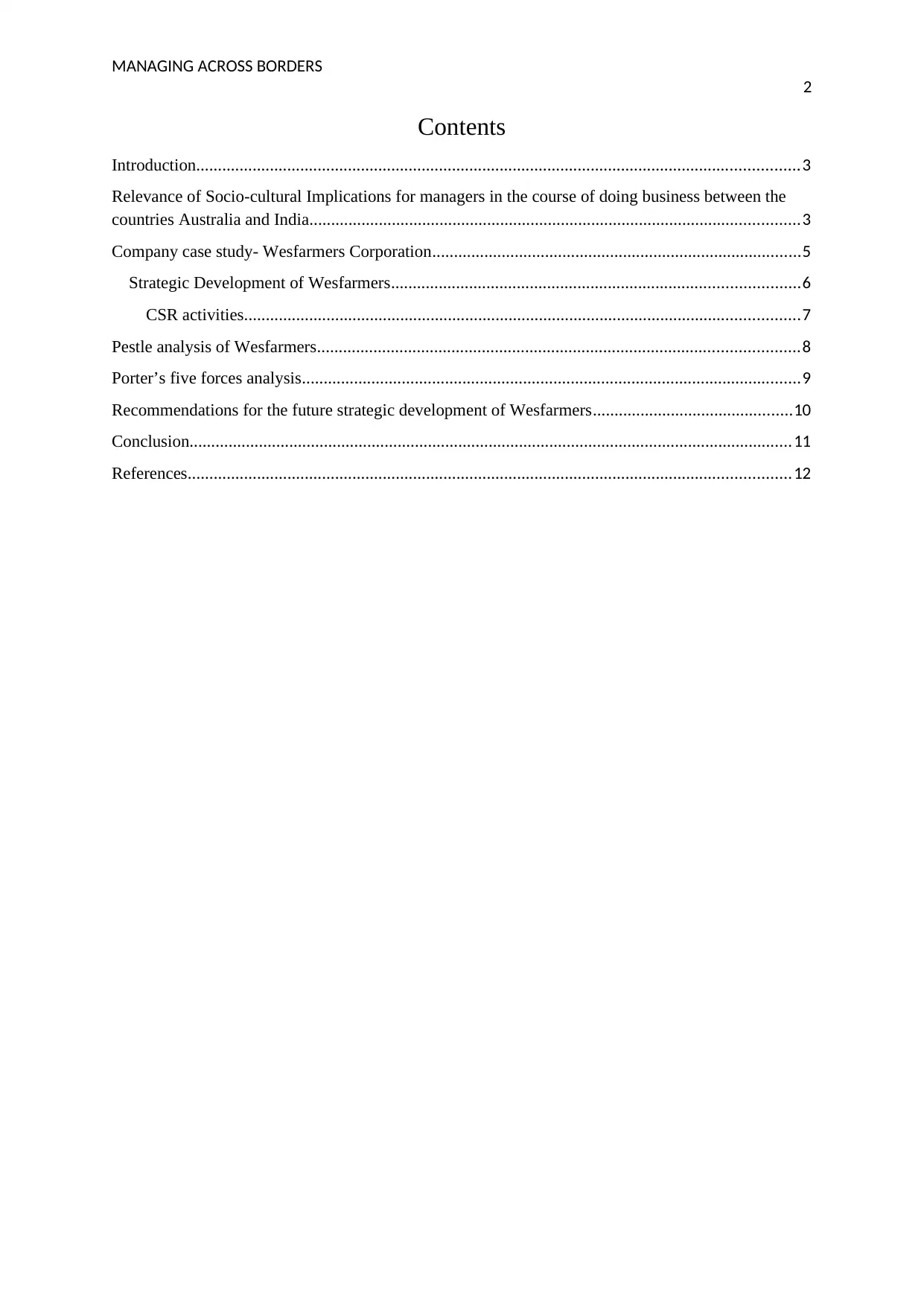
MANAGING ACROSS BORDERS
2
Contents
Introduction...........................................................................................................................................3
Relevance of Socio-cultural Implications for managers in the course of doing business between the
countries Australia and India.................................................................................................................3
Company case study- Wesfarmers Corporation.....................................................................................5
Strategic Development of Wesfarmers..............................................................................................6
CSR activities................................................................................................................................7
Pestle analysis of Wesfarmers...............................................................................................................8
Porter’s five forces analysis...................................................................................................................9
Recommendations for the future strategic development of Wesfarmers..............................................10
Conclusion...........................................................................................................................................11
References...........................................................................................................................................12
2
Contents
Introduction...........................................................................................................................................3
Relevance of Socio-cultural Implications for managers in the course of doing business between the
countries Australia and India.................................................................................................................3
Company case study- Wesfarmers Corporation.....................................................................................5
Strategic Development of Wesfarmers..............................................................................................6
CSR activities................................................................................................................................7
Pestle analysis of Wesfarmers...............................................................................................................8
Porter’s five forces analysis...................................................................................................................9
Recommendations for the future strategic development of Wesfarmers..............................................10
Conclusion...........................................................................................................................................11
References...........................................................................................................................................12
⊘ This is a preview!⊘
Do you want full access?
Subscribe today to unlock all pages.

Trusted by 1+ million students worldwide
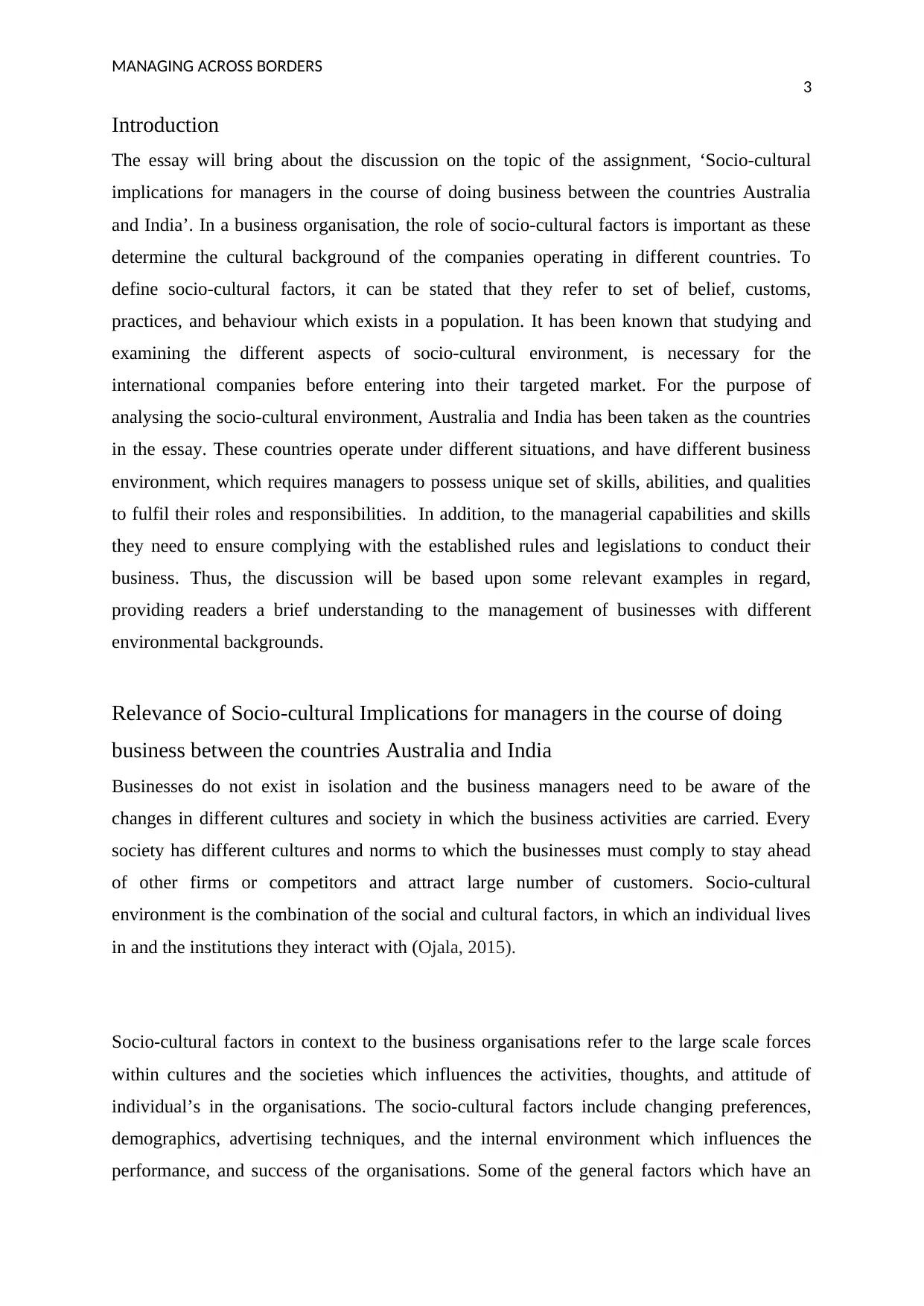
MANAGING ACROSS BORDERS
3
Introduction
The essay will bring about the discussion on the topic of the assignment, ‘Socio-cultural
implications for managers in the course of doing business between the countries Australia
and India’. In a business organisation, the role of socio-cultural factors is important as these
determine the cultural background of the companies operating in different countries. To
define socio-cultural factors, it can be stated that they refer to set of belief, customs,
practices, and behaviour which exists in a population. It has been known that studying and
examining the different aspects of socio-cultural environment, is necessary for the
international companies before entering into their targeted market. For the purpose of
analysing the socio-cultural environment, Australia and India has been taken as the countries
in the essay. These countries operate under different situations, and have different business
environment, which requires managers to possess unique set of skills, abilities, and qualities
to fulfil their roles and responsibilities. In addition, to the managerial capabilities and skills
they need to ensure complying with the established rules and legislations to conduct their
business. Thus, the discussion will be based upon some relevant examples in regard,
providing readers a brief understanding to the management of businesses with different
environmental backgrounds.
Relevance of Socio-cultural Implications for managers in the course of doing
business between the countries Australia and India
Businesses do not exist in isolation and the business managers need to be aware of the
changes in different cultures and society in which the business activities are carried. Every
society has different cultures and norms to which the businesses must comply to stay ahead
of other firms or competitors and attract large number of customers. Socio-cultural
environment is the combination of the social and cultural factors, in which an individual lives
in and the institutions they interact with (Ojala, 2015).
Socio-cultural factors in context to the business organisations refer to the large scale forces
within cultures and the societies which influences the activities, thoughts, and attitude of
individual’s in the organisations. The socio-cultural factors include changing preferences,
demographics, advertising techniques, and the internal environment which influences the
performance, and success of the organisations. Some of the general factors which have an
3
Introduction
The essay will bring about the discussion on the topic of the assignment, ‘Socio-cultural
implications for managers in the course of doing business between the countries Australia
and India’. In a business organisation, the role of socio-cultural factors is important as these
determine the cultural background of the companies operating in different countries. To
define socio-cultural factors, it can be stated that they refer to set of belief, customs,
practices, and behaviour which exists in a population. It has been known that studying and
examining the different aspects of socio-cultural environment, is necessary for the
international companies before entering into their targeted market. For the purpose of
analysing the socio-cultural environment, Australia and India has been taken as the countries
in the essay. These countries operate under different situations, and have different business
environment, which requires managers to possess unique set of skills, abilities, and qualities
to fulfil their roles and responsibilities. In addition, to the managerial capabilities and skills
they need to ensure complying with the established rules and legislations to conduct their
business. Thus, the discussion will be based upon some relevant examples in regard,
providing readers a brief understanding to the management of businesses with different
environmental backgrounds.
Relevance of Socio-cultural Implications for managers in the course of doing
business between the countries Australia and India
Businesses do not exist in isolation and the business managers need to be aware of the
changes in different cultures and society in which the business activities are carried. Every
society has different cultures and norms to which the businesses must comply to stay ahead
of other firms or competitors and attract large number of customers. Socio-cultural
environment is the combination of the social and cultural factors, in which an individual lives
in and the institutions they interact with (Ojala, 2015).
Socio-cultural factors in context to the business organisations refer to the large scale forces
within cultures and the societies which influences the activities, thoughts, and attitude of
individual’s in the organisations. The socio-cultural factors include changing preferences,
demographics, advertising techniques, and the internal environment which influences the
performance, and success of the organisations. Some of the general factors which have an
Paraphrase This Document
Need a fresh take? Get an instant paraphrase of this document with our AI Paraphraser
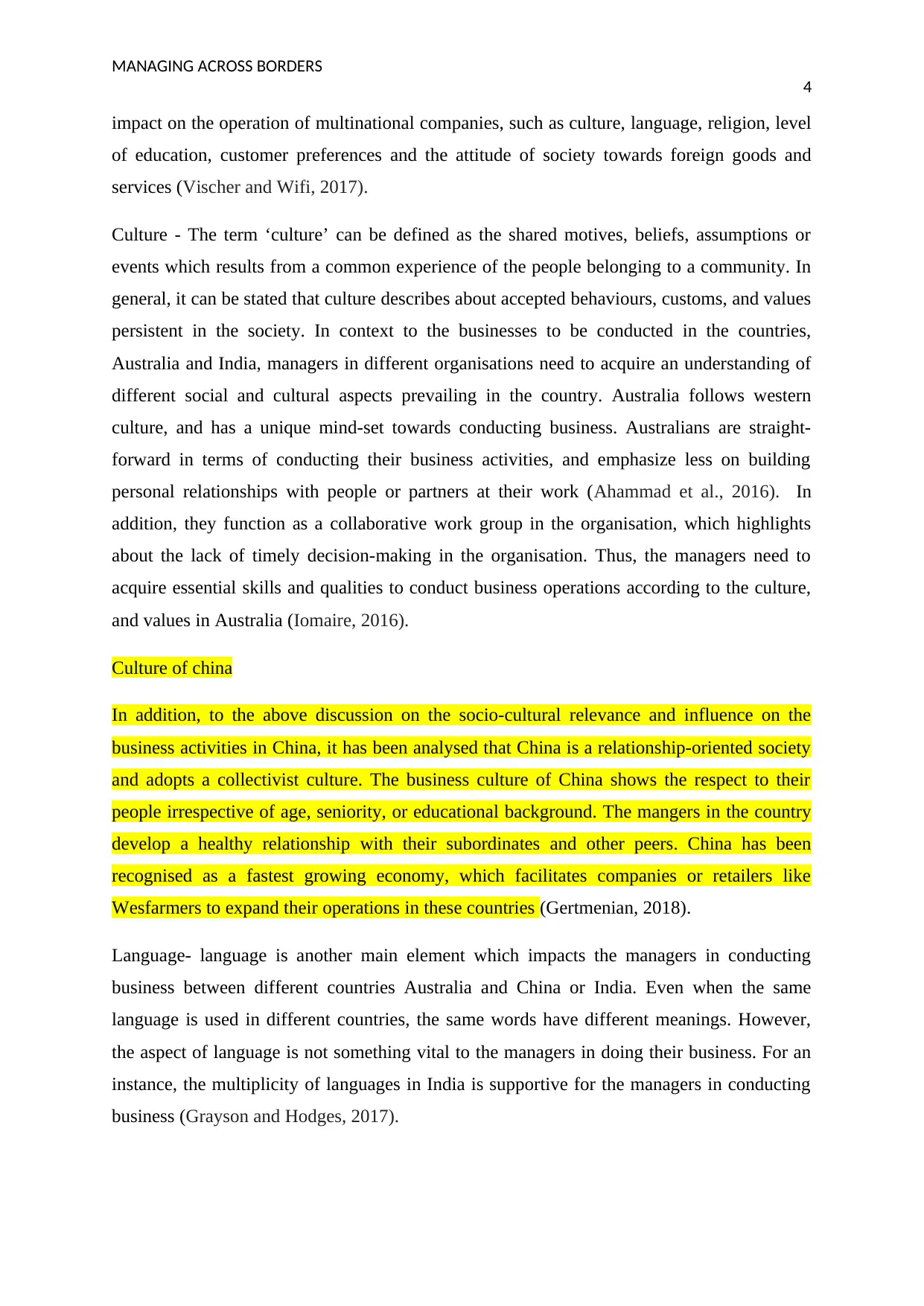
MANAGING ACROSS BORDERS
4
impact on the operation of multinational companies, such as culture, language, religion, level
of education, customer preferences and the attitude of society towards foreign goods and
services (Vischer and Wifi, 2017).
Culture - The term ‘culture’ can be defined as the shared motives, beliefs, assumptions or
events which results from a common experience of the people belonging to a community. In
general, it can be stated that culture describes about accepted behaviours, customs, and values
persistent in the society. In context to the businesses to be conducted in the countries,
Australia and India, managers in different organisations need to acquire an understanding of
different social and cultural aspects prevailing in the country. Australia follows western
culture, and has a unique mind-set towards conducting business. Australians are straight-
forward in terms of conducting their business activities, and emphasize less on building
personal relationships with people or partners at their work (Ahammad et al., 2016). In
addition, they function as a collaborative work group in the organisation, which highlights
about the lack of timely decision-making in the organisation. Thus, the managers need to
acquire essential skills and qualities to conduct business operations according to the culture,
and values in Australia (Iomaire, 2016).
Culture of china
In addition, to the above discussion on the socio-cultural relevance and influence on the
business activities in China, it has been analysed that China is a relationship-oriented society
and adopts a collectivist culture. The business culture of China shows the respect to their
people irrespective of age, seniority, or educational background. The mangers in the country
develop a healthy relationship with their subordinates and other peers. China has been
recognised as a fastest growing economy, which facilitates companies or retailers like
Wesfarmers to expand their operations in these countries (Gertmenian, 2018).
Language- language is another main element which impacts the managers in conducting
business between different countries Australia and China or India. Even when the same
language is used in different countries, the same words have different meanings. However,
the aspect of language is not something vital to the managers in doing their business. For an
instance, the multiplicity of languages in India is supportive for the managers in conducting
business (Grayson and Hodges, 2017).
4
impact on the operation of multinational companies, such as culture, language, religion, level
of education, customer preferences and the attitude of society towards foreign goods and
services (Vischer and Wifi, 2017).
Culture - The term ‘culture’ can be defined as the shared motives, beliefs, assumptions or
events which results from a common experience of the people belonging to a community. In
general, it can be stated that culture describes about accepted behaviours, customs, and values
persistent in the society. In context to the businesses to be conducted in the countries,
Australia and India, managers in different organisations need to acquire an understanding of
different social and cultural aspects prevailing in the country. Australia follows western
culture, and has a unique mind-set towards conducting business. Australians are straight-
forward in terms of conducting their business activities, and emphasize less on building
personal relationships with people or partners at their work (Ahammad et al., 2016). In
addition, they function as a collaborative work group in the organisation, which highlights
about the lack of timely decision-making in the organisation. Thus, the managers need to
acquire essential skills and qualities to conduct business operations according to the culture,
and values in Australia (Iomaire, 2016).
Culture of china
In addition, to the above discussion on the socio-cultural relevance and influence on the
business activities in China, it has been analysed that China is a relationship-oriented society
and adopts a collectivist culture. The business culture of China shows the respect to their
people irrespective of age, seniority, or educational background. The mangers in the country
develop a healthy relationship with their subordinates and other peers. China has been
recognised as a fastest growing economy, which facilitates companies or retailers like
Wesfarmers to expand their operations in these countries (Gertmenian, 2018).
Language- language is another main element which impacts the managers in conducting
business between different countries Australia and China or India. Even when the same
language is used in different countries, the same words have different meanings. However,
the aspect of language is not something vital to the managers in doing their business. For an
instance, the multiplicity of languages in India is supportive for the managers in conducting
business (Grayson and Hodges, 2017).
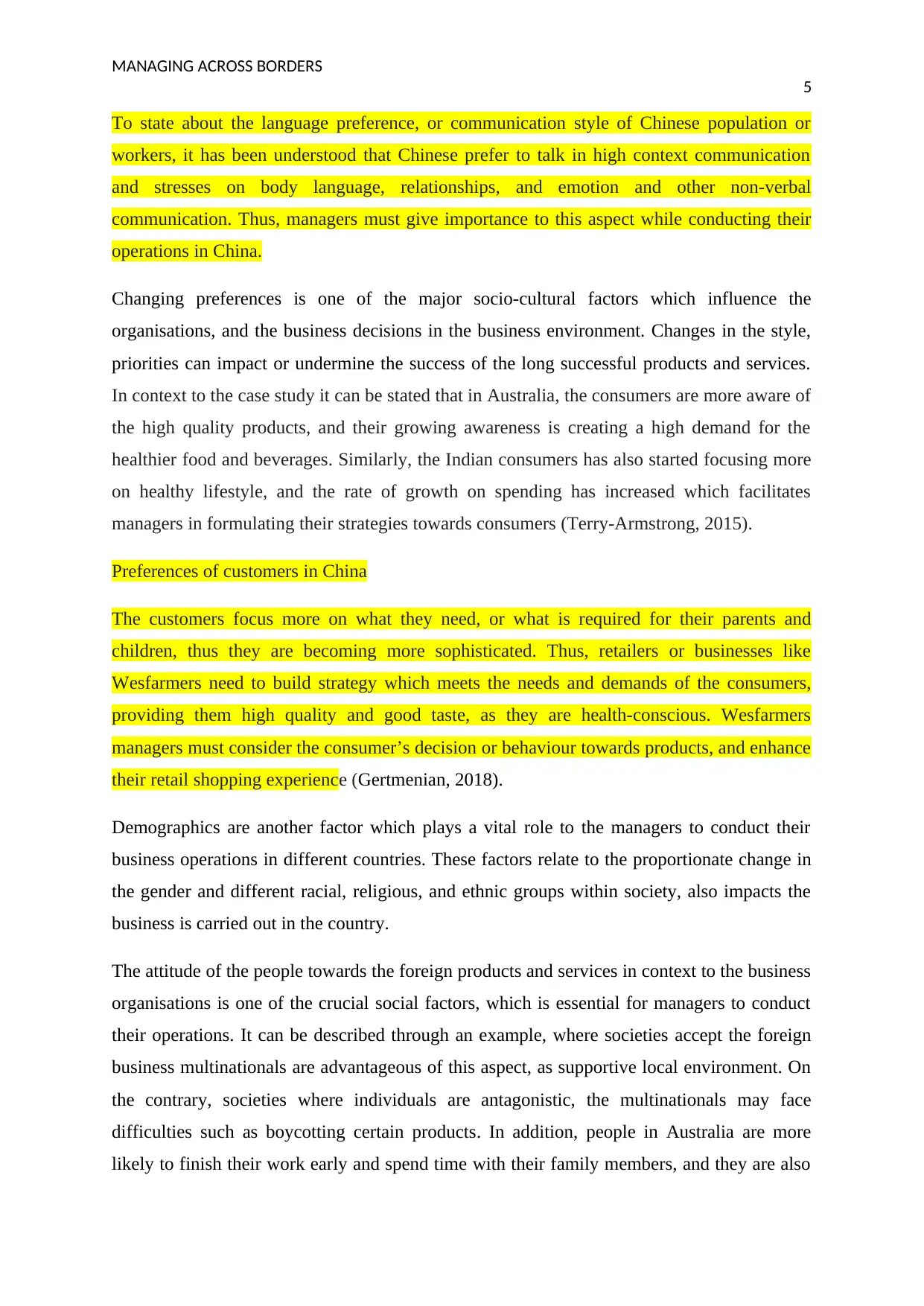
MANAGING ACROSS BORDERS
5
To state about the language preference, or communication style of Chinese population or
workers, it has been understood that Chinese prefer to talk in high context communication
and stresses on body language, relationships, and emotion and other non-verbal
communication. Thus, managers must give importance to this aspect while conducting their
operations in China.
Changing preferences is one of the major socio-cultural factors which influence the
organisations, and the business decisions in the business environment. Changes in the style,
priorities can impact or undermine the success of the long successful products and services.
In context to the case study it can be stated that in Australia, the consumers are more aware of
the high quality products, and their growing awareness is creating a high demand for the
healthier food and beverages. Similarly, the Indian consumers has also started focusing more
on healthy lifestyle, and the rate of growth on spending has increased which facilitates
managers in formulating their strategies towards consumers (Terry-Armstrong, 2015).
Preferences of customers in China
The customers focus more on what they need, or what is required for their parents and
children, thus they are becoming more sophisticated. Thus, retailers or businesses like
Wesfarmers need to build strategy which meets the needs and demands of the consumers,
providing them high quality and good taste, as they are health-conscious. Wesfarmers
managers must consider the consumer’s decision or behaviour towards products, and enhance
their retail shopping experience (Gertmenian, 2018).
Demographics are another factor which plays a vital role to the managers to conduct their
business operations in different countries. These factors relate to the proportionate change in
the gender and different racial, religious, and ethnic groups within society, also impacts the
business is carried out in the country.
The attitude of the people towards the foreign products and services in context to the business
organisations is one of the crucial social factors, which is essential for managers to conduct
their operations. It can be described through an example, where societies accept the foreign
business multinationals are advantageous of this aspect, as supportive local environment. On
the contrary, societies where individuals are antagonistic, the multinationals may face
difficulties such as boycotting certain products. In addition, people in Australia are more
likely to finish their work early and spend time with their family members, and they are also
5
To state about the language preference, or communication style of Chinese population or
workers, it has been understood that Chinese prefer to talk in high context communication
and stresses on body language, relationships, and emotion and other non-verbal
communication. Thus, managers must give importance to this aspect while conducting their
operations in China.
Changing preferences is one of the major socio-cultural factors which influence the
organisations, and the business decisions in the business environment. Changes in the style,
priorities can impact or undermine the success of the long successful products and services.
In context to the case study it can be stated that in Australia, the consumers are more aware of
the high quality products, and their growing awareness is creating a high demand for the
healthier food and beverages. Similarly, the Indian consumers has also started focusing more
on healthy lifestyle, and the rate of growth on spending has increased which facilitates
managers in formulating their strategies towards consumers (Terry-Armstrong, 2015).
Preferences of customers in China
The customers focus more on what they need, or what is required for their parents and
children, thus they are becoming more sophisticated. Thus, retailers or businesses like
Wesfarmers need to build strategy which meets the needs and demands of the consumers,
providing them high quality and good taste, as they are health-conscious. Wesfarmers
managers must consider the consumer’s decision or behaviour towards products, and enhance
their retail shopping experience (Gertmenian, 2018).
Demographics are another factor which plays a vital role to the managers to conduct their
business operations in different countries. These factors relate to the proportionate change in
the gender and different racial, religious, and ethnic groups within society, also impacts the
business is carried out in the country.
The attitude of the people towards the foreign products and services in context to the business
organisations is one of the crucial social factors, which is essential for managers to conduct
their operations. It can be described through an example, where societies accept the foreign
business multinationals are advantageous of this aspect, as supportive local environment. On
the contrary, societies where individuals are antagonistic, the multinationals may face
difficulties such as boycotting certain products. In addition, people in Australia are more
likely to finish their work early and spend time with their family members, and they are also
⊘ This is a preview!⊘
Do you want full access?
Subscribe today to unlock all pages.

Trusted by 1+ million students worldwide
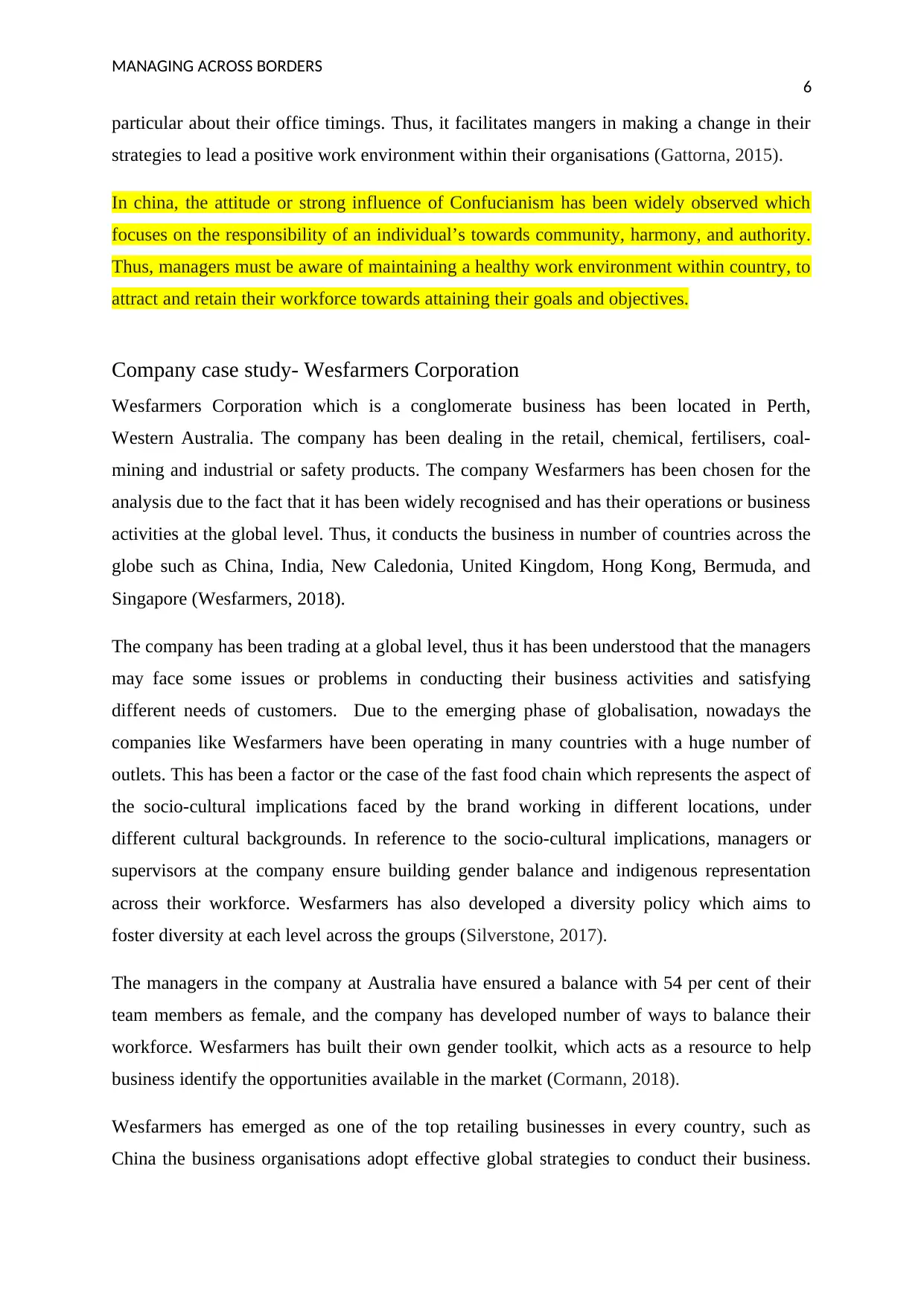
MANAGING ACROSS BORDERS
6
particular about their office timings. Thus, it facilitates mangers in making a change in their
strategies to lead a positive work environment within their organisations (Gattorna, 2015).
In china, the attitude or strong influence of Confucianism has been widely observed which
focuses on the responsibility of an individual’s towards community, harmony, and authority.
Thus, managers must be aware of maintaining a healthy work environment within country, to
attract and retain their workforce towards attaining their goals and objectives.
Company case study- Wesfarmers Corporation
Wesfarmers Corporation which is a conglomerate business has been located in Perth,
Western Australia. The company has been dealing in the retail, chemical, fertilisers, coal-
mining and industrial or safety products. The company Wesfarmers has been chosen for the
analysis due to the fact that it has been widely recognised and has their operations or business
activities at the global level. Thus, it conducts the business in number of countries across the
globe such as China, India, New Caledonia, United Kingdom, Hong Kong, Bermuda, and
Singapore (Wesfarmers, 2018).
The company has been trading at a global level, thus it has been understood that the managers
may face some issues or problems in conducting their business activities and satisfying
different needs of customers. Due to the emerging phase of globalisation, nowadays the
companies like Wesfarmers have been operating in many countries with a huge number of
outlets. This has been a factor or the case of the fast food chain which represents the aspect of
the socio-cultural implications faced by the brand working in different locations, under
different cultural backgrounds. In reference to the socio-cultural implications, managers or
supervisors at the company ensure building gender balance and indigenous representation
across their workforce. Wesfarmers has also developed a diversity policy which aims to
foster diversity at each level across the groups (Silverstone, 2017).
The managers in the company at Australia have ensured a balance with 54 per cent of their
team members as female, and the company has developed number of ways to balance their
workforce. Wesfarmers has built their own gender toolkit, which acts as a resource to help
business identify the opportunities available in the market (Cormann, 2018).
Wesfarmers has emerged as one of the top retailing businesses in every country, such as
China the business organisations adopt effective global strategies to conduct their business.
6
particular about their office timings. Thus, it facilitates mangers in making a change in their
strategies to lead a positive work environment within their organisations (Gattorna, 2015).
In china, the attitude or strong influence of Confucianism has been widely observed which
focuses on the responsibility of an individual’s towards community, harmony, and authority.
Thus, managers must be aware of maintaining a healthy work environment within country, to
attract and retain their workforce towards attaining their goals and objectives.
Company case study- Wesfarmers Corporation
Wesfarmers Corporation which is a conglomerate business has been located in Perth,
Western Australia. The company has been dealing in the retail, chemical, fertilisers, coal-
mining and industrial or safety products. The company Wesfarmers has been chosen for the
analysis due to the fact that it has been widely recognised and has their operations or business
activities at the global level. Thus, it conducts the business in number of countries across the
globe such as China, India, New Caledonia, United Kingdom, Hong Kong, Bermuda, and
Singapore (Wesfarmers, 2018).
The company has been trading at a global level, thus it has been understood that the managers
may face some issues or problems in conducting their business activities and satisfying
different needs of customers. Due to the emerging phase of globalisation, nowadays the
companies like Wesfarmers have been operating in many countries with a huge number of
outlets. This has been a factor or the case of the fast food chain which represents the aspect of
the socio-cultural implications faced by the brand working in different locations, under
different cultural backgrounds. In reference to the socio-cultural implications, managers or
supervisors at the company ensure building gender balance and indigenous representation
across their workforce. Wesfarmers has also developed a diversity policy which aims to
foster diversity at each level across the groups (Silverstone, 2017).
The managers in the company at Australia have ensured a balance with 54 per cent of their
team members as female, and the company has developed number of ways to balance their
workforce. Wesfarmers has built their own gender toolkit, which acts as a resource to help
business identify the opportunities available in the market (Cormann, 2018).
Wesfarmers has emerged as one of the top retailing businesses in every country, such as
China the business organisations adopt effective global strategies to conduct their business.
Paraphrase This Document
Need a fresh take? Get an instant paraphrase of this document with our AI Paraphraser
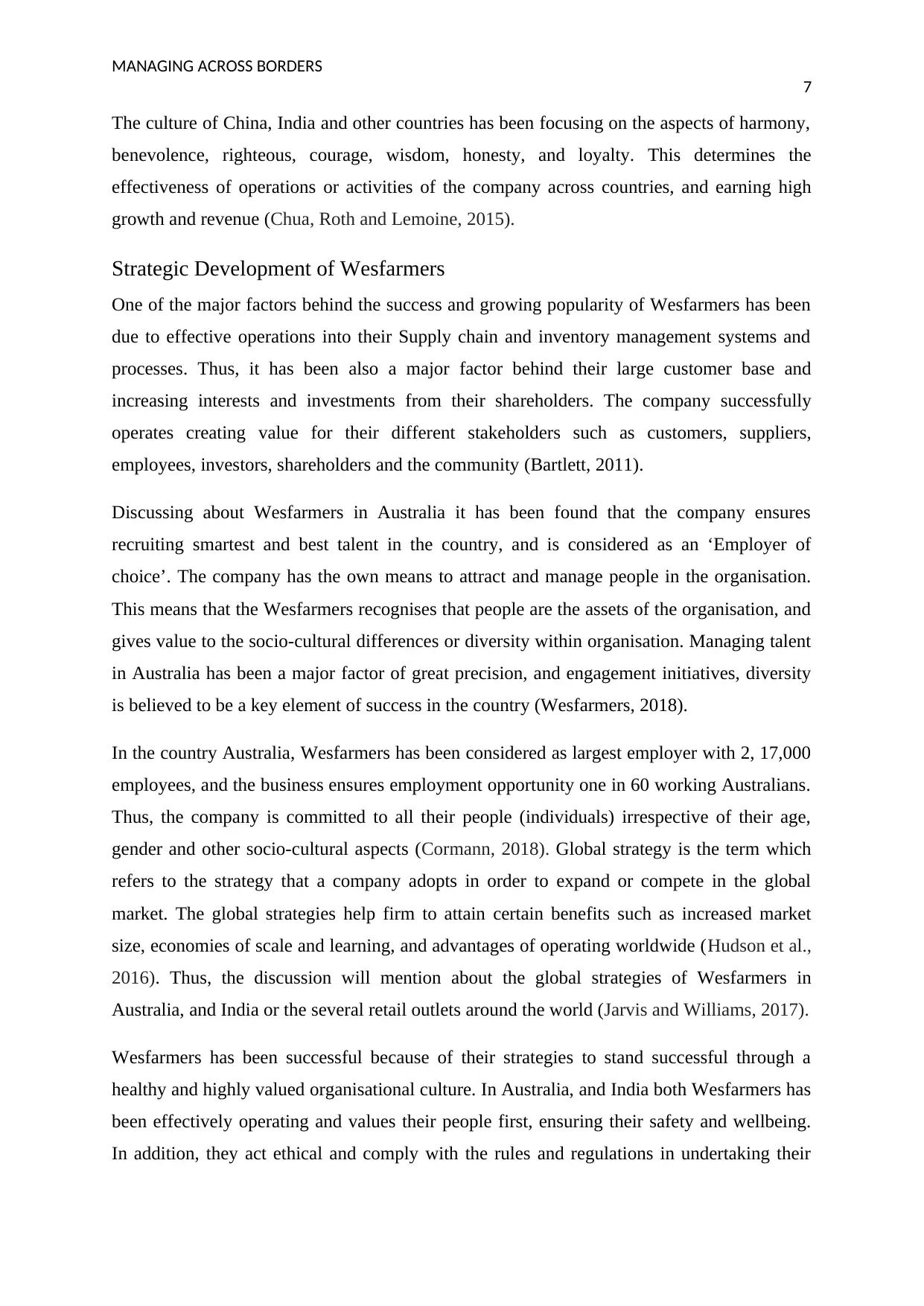
MANAGING ACROSS BORDERS
7
The culture of China, India and other countries has been focusing on the aspects of harmony,
benevolence, righteous, courage, wisdom, honesty, and loyalty. This determines the
effectiveness of operations or activities of the company across countries, and earning high
growth and revenue (Chua, Roth and Lemoine, 2015).
Strategic Development of Wesfarmers
One of the major factors behind the success and growing popularity of Wesfarmers has been
due to effective operations into their Supply chain and inventory management systems and
processes. Thus, it has been also a major factor behind their large customer base and
increasing interests and investments from their shareholders. The company successfully
operates creating value for their different stakeholders such as customers, suppliers,
employees, investors, shareholders and the community (Bartlett, 2011).
Discussing about Wesfarmers in Australia it has been found that the company ensures
recruiting smartest and best talent in the country, and is considered as an ‘Employer of
choice’. The company has the own means to attract and manage people in the organisation.
This means that the Wesfarmers recognises that people are the assets of the organisation, and
gives value to the socio-cultural differences or diversity within organisation. Managing talent
in Australia has been a major factor of great precision, and engagement initiatives, diversity
is believed to be a key element of success in the country (Wesfarmers, 2018).
In the country Australia, Wesfarmers has been considered as largest employer with 2, 17,000
employees, and the business ensures employment opportunity one in 60 working Australians.
Thus, the company is committed to all their people (individuals) irrespective of their age,
gender and other socio-cultural aspects (Cormann, 2018). Global strategy is the term which
refers to the strategy that a company adopts in order to expand or compete in the global
market. The global strategies help firm to attain certain benefits such as increased market
size, economies of scale and learning, and advantages of operating worldwide (Hudson et al.,
2016). Thus, the discussion will mention about the global strategies of Wesfarmers in
Australia, and India or the several retail outlets around the world (Jarvis and Williams, 2017).
Wesfarmers has been successful because of their strategies to stand successful through a
healthy and highly valued organisational culture. In Australia, and India both Wesfarmers has
been effectively operating and values their people first, ensuring their safety and wellbeing.
In addition, they act ethical and comply with the rules and regulations in undertaking their
7
The culture of China, India and other countries has been focusing on the aspects of harmony,
benevolence, righteous, courage, wisdom, honesty, and loyalty. This determines the
effectiveness of operations or activities of the company across countries, and earning high
growth and revenue (Chua, Roth and Lemoine, 2015).
Strategic Development of Wesfarmers
One of the major factors behind the success and growing popularity of Wesfarmers has been
due to effective operations into their Supply chain and inventory management systems and
processes. Thus, it has been also a major factor behind their large customer base and
increasing interests and investments from their shareholders. The company successfully
operates creating value for their different stakeholders such as customers, suppliers,
employees, investors, shareholders and the community (Bartlett, 2011).
Discussing about Wesfarmers in Australia it has been found that the company ensures
recruiting smartest and best talent in the country, and is considered as an ‘Employer of
choice’. The company has the own means to attract and manage people in the organisation.
This means that the Wesfarmers recognises that people are the assets of the organisation, and
gives value to the socio-cultural differences or diversity within organisation. Managing talent
in Australia has been a major factor of great precision, and engagement initiatives, diversity
is believed to be a key element of success in the country (Wesfarmers, 2018).
In the country Australia, Wesfarmers has been considered as largest employer with 2, 17,000
employees, and the business ensures employment opportunity one in 60 working Australians.
Thus, the company is committed to all their people (individuals) irrespective of their age,
gender and other socio-cultural aspects (Cormann, 2018). Global strategy is the term which
refers to the strategy that a company adopts in order to expand or compete in the global
market. The global strategies help firm to attain certain benefits such as increased market
size, economies of scale and learning, and advantages of operating worldwide (Hudson et al.,
2016). Thus, the discussion will mention about the global strategies of Wesfarmers in
Australia, and India or the several retail outlets around the world (Jarvis and Williams, 2017).
Wesfarmers has been successful because of their strategies to stand successful through a
healthy and highly valued organisational culture. In Australia, and India both Wesfarmers has
been effectively operating and values their people first, ensuring their safety and wellbeing.
In addition, they act ethical and comply with the rules and regulations in undertaking their
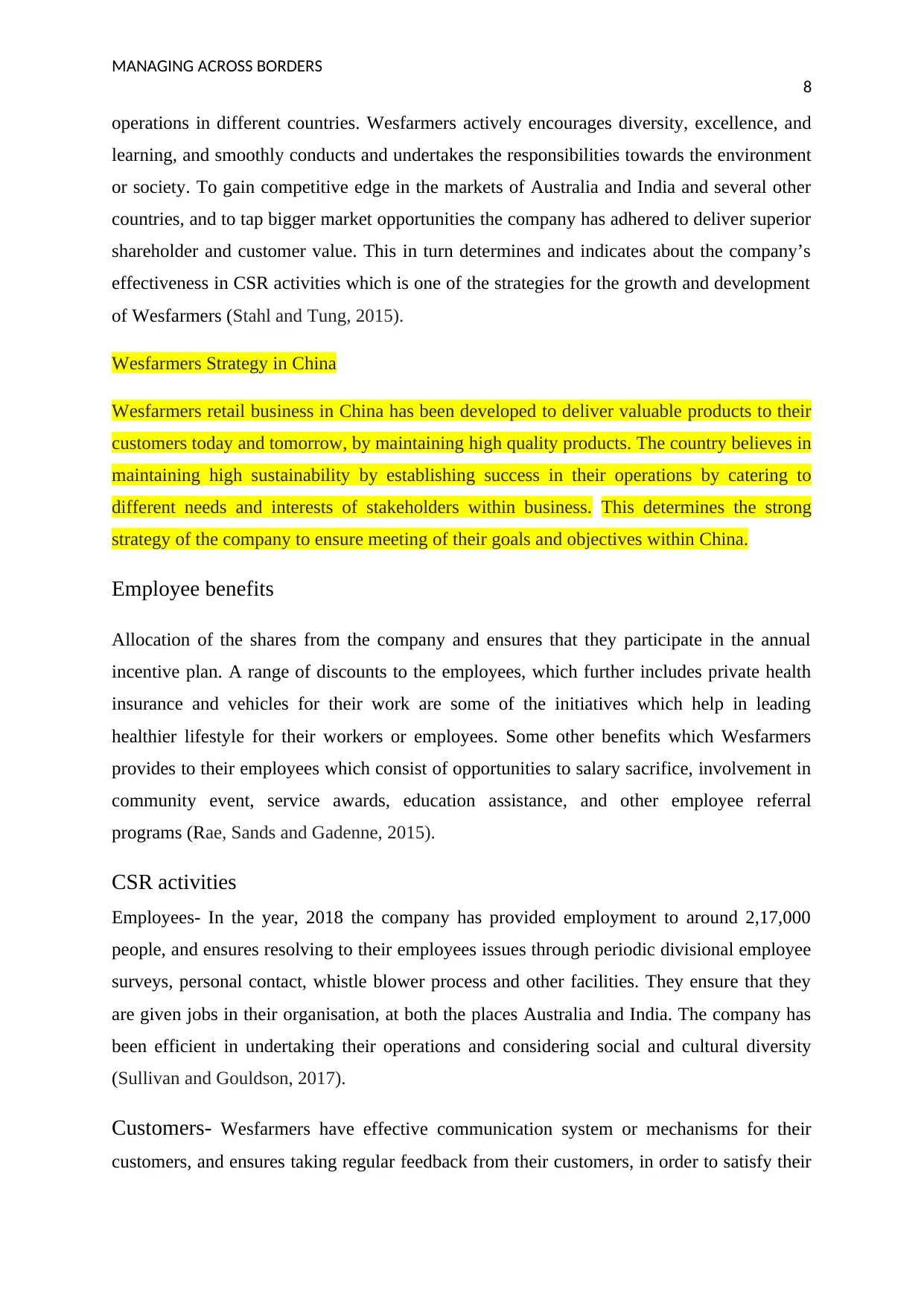
MANAGING ACROSS BORDERS
8
operations in different countries. Wesfarmers actively encourages diversity, excellence, and
learning, and smoothly conducts and undertakes the responsibilities towards the environment
or society. To gain competitive edge in the markets of Australia and India and several other
countries, and to tap bigger market opportunities the company has adhered to deliver superior
shareholder and customer value. This in turn determines and indicates about the company’s
effectiveness in CSR activities which is one of the strategies for the growth and development
of Wesfarmers (Stahl and Tung, 2015).
Wesfarmers Strategy in China
Wesfarmers retail business in China has been developed to deliver valuable products to their
customers today and tomorrow, by maintaining high quality products. The country believes in
maintaining high sustainability by establishing success in their operations by catering to
different needs and interests of stakeholders within business. This determines the strong
strategy of the company to ensure meeting of their goals and objectives within China.
Employee benefits
Allocation of the shares from the company and ensures that they participate in the annual
incentive plan. A range of discounts to the employees, which further includes private health
insurance and vehicles for their work are some of the initiatives which help in leading
healthier lifestyle for their workers or employees. Some other benefits which Wesfarmers
provides to their employees which consist of opportunities to salary sacrifice, involvement in
community event, service awards, education assistance, and other employee referral
programs (Rae, Sands and Gadenne, 2015).
CSR activities
Employees- In the year, 2018 the company has provided employment to around 2,17,000
people, and ensures resolving to their employees issues through periodic divisional employee
surveys, personal contact, whistle blower process and other facilities. They ensure that they
are given jobs in their organisation, at both the places Australia and India. The company has
been efficient in undertaking their operations and considering social and cultural diversity
(Sullivan and Gouldson, 2017).
Customers- Wesfarmers have effective communication system or mechanisms for their
customers, and ensures taking regular feedback from their customers, in order to satisfy their
8
operations in different countries. Wesfarmers actively encourages diversity, excellence, and
learning, and smoothly conducts and undertakes the responsibilities towards the environment
or society. To gain competitive edge in the markets of Australia and India and several other
countries, and to tap bigger market opportunities the company has adhered to deliver superior
shareholder and customer value. This in turn determines and indicates about the company’s
effectiveness in CSR activities which is one of the strategies for the growth and development
of Wesfarmers (Stahl and Tung, 2015).
Wesfarmers Strategy in China
Wesfarmers retail business in China has been developed to deliver valuable products to their
customers today and tomorrow, by maintaining high quality products. The country believes in
maintaining high sustainability by establishing success in their operations by catering to
different needs and interests of stakeholders within business. This determines the strong
strategy of the company to ensure meeting of their goals and objectives within China.
Employee benefits
Allocation of the shares from the company and ensures that they participate in the annual
incentive plan. A range of discounts to the employees, which further includes private health
insurance and vehicles for their work are some of the initiatives which help in leading
healthier lifestyle for their workers or employees. Some other benefits which Wesfarmers
provides to their employees which consist of opportunities to salary sacrifice, involvement in
community event, service awards, education assistance, and other employee referral
programs (Rae, Sands and Gadenne, 2015).
CSR activities
Employees- In the year, 2018 the company has provided employment to around 2,17,000
people, and ensures resolving to their employees issues through periodic divisional employee
surveys, personal contact, whistle blower process and other facilities. They ensure that they
are given jobs in their organisation, at both the places Australia and India. The company has
been efficient in undertaking their operations and considering social and cultural diversity
(Sullivan and Gouldson, 2017).
Customers- Wesfarmers have effective communication system or mechanisms for their
customers, and ensures taking regular feedback from their customers, in order to satisfy their
⊘ This is a preview!⊘
Do you want full access?
Subscribe today to unlock all pages.

Trusted by 1+ million students worldwide
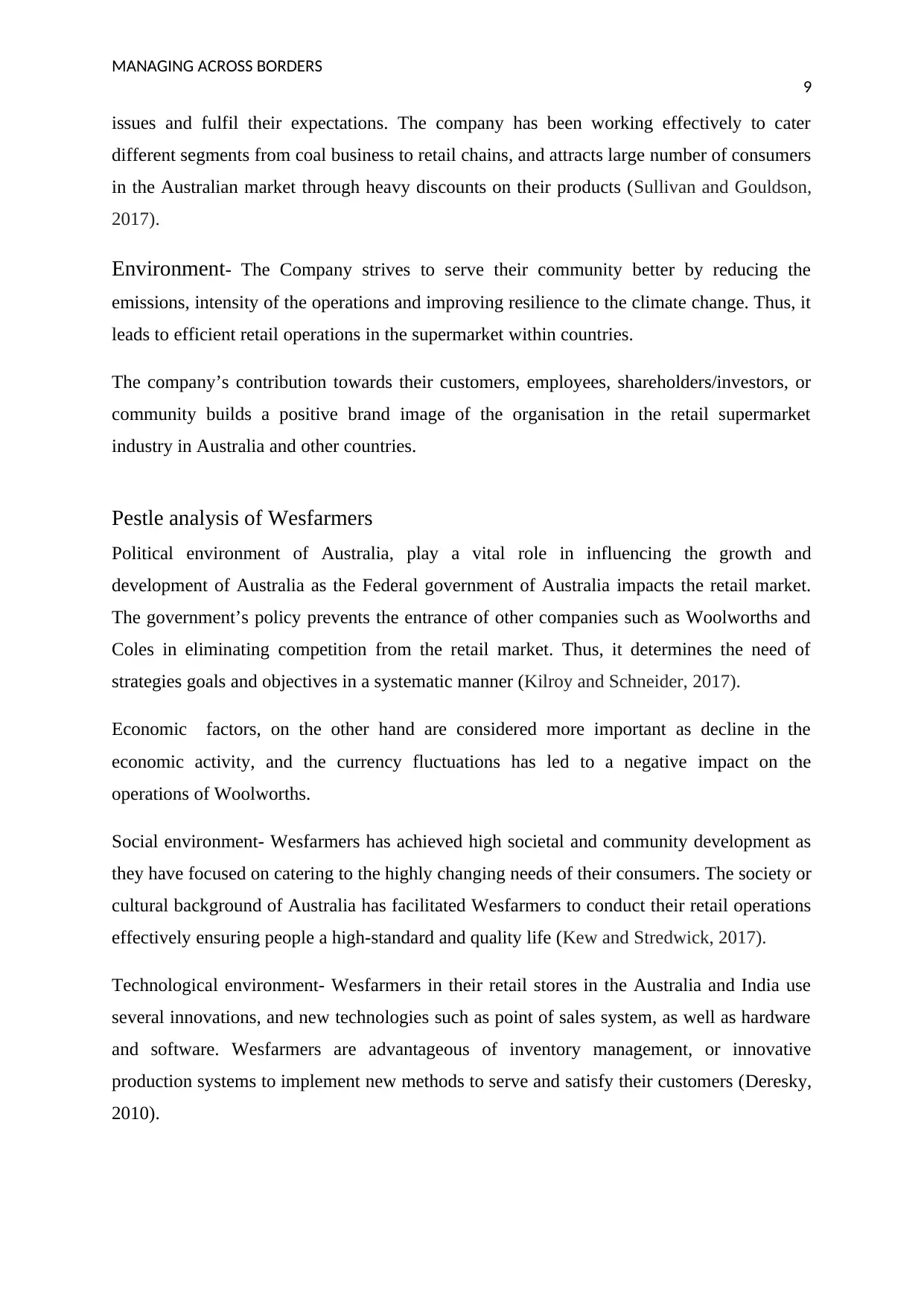
MANAGING ACROSS BORDERS
9
issues and fulfil their expectations. The company has been working effectively to cater
different segments from coal business to retail chains, and attracts large number of consumers
in the Australian market through heavy discounts on their products (Sullivan and Gouldson,
2017).
Environment- The Company strives to serve their community better by reducing the
emissions, intensity of the operations and improving resilience to the climate change. Thus, it
leads to efficient retail operations in the supermarket within countries.
The company’s contribution towards their customers, employees, shareholders/investors, or
community builds a positive brand image of the organisation in the retail supermarket
industry in Australia and other countries.
Pestle analysis of Wesfarmers
Political environment of Australia, play a vital role in influencing the growth and
development of Australia as the Federal government of Australia impacts the retail market.
The government’s policy prevents the entrance of other companies such as Woolworths and
Coles in eliminating competition from the retail market. Thus, it determines the need of
strategies goals and objectives in a systematic manner (Kilroy and Schneider, 2017).
Economic factors, on the other hand are considered more important as decline in the
economic activity, and the currency fluctuations has led to a negative impact on the
operations of Woolworths.
Social environment- Wesfarmers has achieved high societal and community development as
they have focused on catering to the highly changing needs of their consumers. The society or
cultural background of Australia has facilitated Wesfarmers to conduct their retail operations
effectively ensuring people a high-standard and quality life (Kew and Stredwick, 2017).
Technological environment- Wesfarmers in their retail stores in the Australia and India use
several innovations, and new technologies such as point of sales system, as well as hardware
and software. Wesfarmers are advantageous of inventory management, or innovative
production systems to implement new methods to serve and satisfy their customers (Deresky,
2010).
9
issues and fulfil their expectations. The company has been working effectively to cater
different segments from coal business to retail chains, and attracts large number of consumers
in the Australian market through heavy discounts on their products (Sullivan and Gouldson,
2017).
Environment- The Company strives to serve their community better by reducing the
emissions, intensity of the operations and improving resilience to the climate change. Thus, it
leads to efficient retail operations in the supermarket within countries.
The company’s contribution towards their customers, employees, shareholders/investors, or
community builds a positive brand image of the organisation in the retail supermarket
industry in Australia and other countries.
Pestle analysis of Wesfarmers
Political environment of Australia, play a vital role in influencing the growth and
development of Australia as the Federal government of Australia impacts the retail market.
The government’s policy prevents the entrance of other companies such as Woolworths and
Coles in eliminating competition from the retail market. Thus, it determines the need of
strategies goals and objectives in a systematic manner (Kilroy and Schneider, 2017).
Economic factors, on the other hand are considered more important as decline in the
economic activity, and the currency fluctuations has led to a negative impact on the
operations of Woolworths.
Social environment- Wesfarmers has achieved high societal and community development as
they have focused on catering to the highly changing needs of their consumers. The society or
cultural background of Australia has facilitated Wesfarmers to conduct their retail operations
effectively ensuring people a high-standard and quality life (Kew and Stredwick, 2017).
Technological environment- Wesfarmers in their retail stores in the Australia and India use
several innovations, and new technologies such as point of sales system, as well as hardware
and software. Wesfarmers are advantageous of inventory management, or innovative
production systems to implement new methods to serve and satisfy their customers (Deresky,
2010).
Paraphrase This Document
Need a fresh take? Get an instant paraphrase of this document with our AI Paraphraser
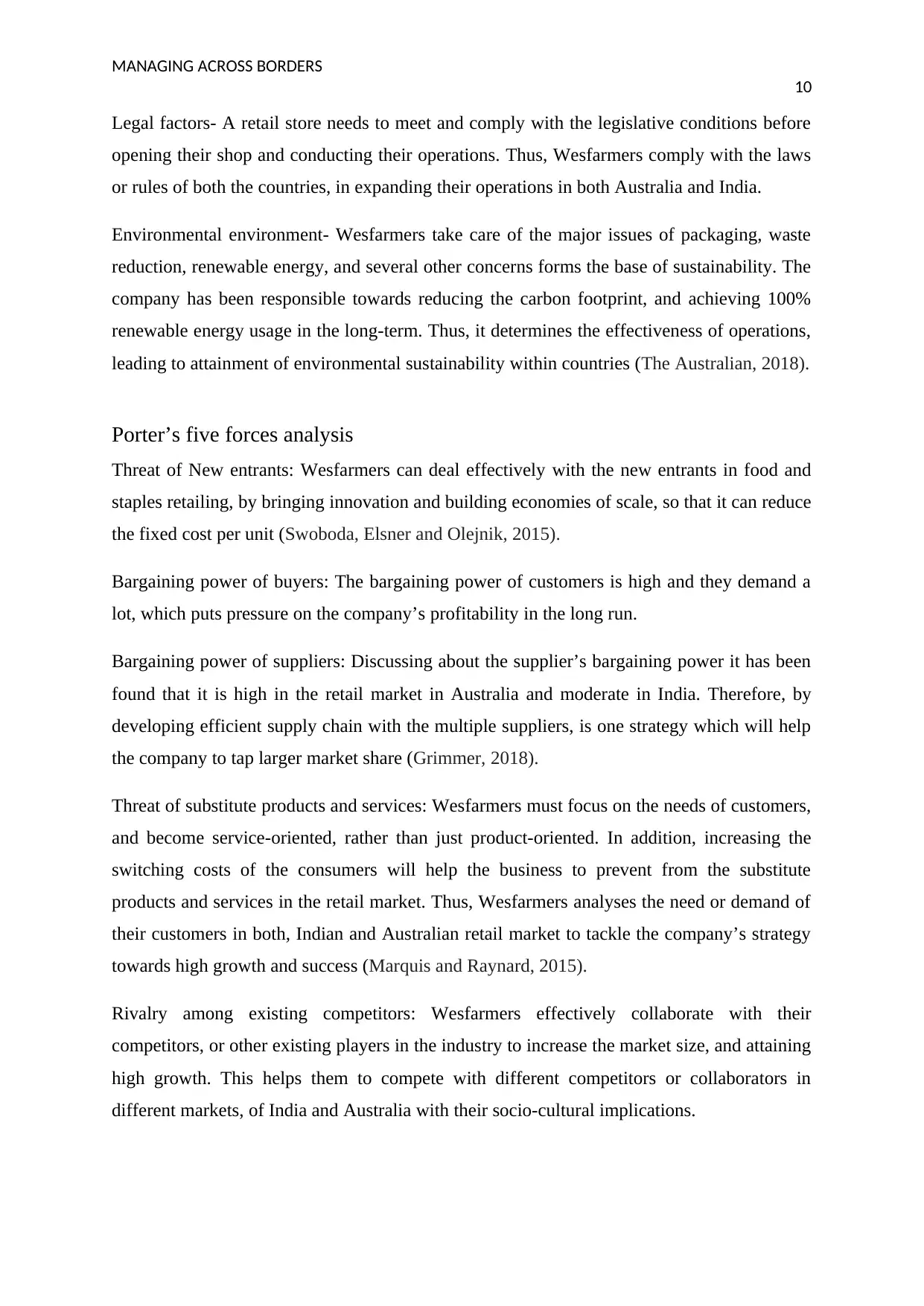
MANAGING ACROSS BORDERS
10
Legal factors- A retail store needs to meet and comply with the legislative conditions before
opening their shop and conducting their operations. Thus, Wesfarmers comply with the laws
or rules of both the countries, in expanding their operations in both Australia and India.
Environmental environment- Wesfarmers take care of the major issues of packaging, waste
reduction, renewable energy, and several other concerns forms the base of sustainability. The
company has been responsible towards reducing the carbon footprint, and achieving 100%
renewable energy usage in the long-term. Thus, it determines the effectiveness of operations,
leading to attainment of environmental sustainability within countries (The Australian, 2018).
Porter’s five forces analysis
Threat of New entrants: Wesfarmers can deal effectively with the new entrants in food and
staples retailing, by bringing innovation and building economies of scale, so that it can reduce
the fixed cost per unit (Swoboda, Elsner and Olejnik, 2015).
Bargaining power of buyers: The bargaining power of customers is high and they demand a
lot, which puts pressure on the company’s profitability in the long run.
Bargaining power of suppliers: Discussing about the supplier’s bargaining power it has been
found that it is high in the retail market in Australia and moderate in India. Therefore, by
developing efficient supply chain with the multiple suppliers, is one strategy which will help
the company to tap larger market share (Grimmer, 2018).
Threat of substitute products and services: Wesfarmers must focus on the needs of customers,
and become service-oriented, rather than just product-oriented. In addition, increasing the
switching costs of the consumers will help the business to prevent from the substitute
products and services in the retail market. Thus, Wesfarmers analyses the need or demand of
their customers in both, Indian and Australian retail market to tackle the company’s strategy
towards high growth and success (Marquis and Raynard, 2015).
Rivalry among existing competitors: Wesfarmers effectively collaborate with their
competitors, or other existing players in the industry to increase the market size, and attaining
high growth. This helps them to compete with different competitors or collaborators in
different markets, of India and Australia with their socio-cultural implications.
10
Legal factors- A retail store needs to meet and comply with the legislative conditions before
opening their shop and conducting their operations. Thus, Wesfarmers comply with the laws
or rules of both the countries, in expanding their operations in both Australia and India.
Environmental environment- Wesfarmers take care of the major issues of packaging, waste
reduction, renewable energy, and several other concerns forms the base of sustainability. The
company has been responsible towards reducing the carbon footprint, and achieving 100%
renewable energy usage in the long-term. Thus, it determines the effectiveness of operations,
leading to attainment of environmental sustainability within countries (The Australian, 2018).
Porter’s five forces analysis
Threat of New entrants: Wesfarmers can deal effectively with the new entrants in food and
staples retailing, by bringing innovation and building economies of scale, so that it can reduce
the fixed cost per unit (Swoboda, Elsner and Olejnik, 2015).
Bargaining power of buyers: The bargaining power of customers is high and they demand a
lot, which puts pressure on the company’s profitability in the long run.
Bargaining power of suppliers: Discussing about the supplier’s bargaining power it has been
found that it is high in the retail market in Australia and moderate in India. Therefore, by
developing efficient supply chain with the multiple suppliers, is one strategy which will help
the company to tap larger market share (Grimmer, 2018).
Threat of substitute products and services: Wesfarmers must focus on the needs of customers,
and become service-oriented, rather than just product-oriented. In addition, increasing the
switching costs of the consumers will help the business to prevent from the substitute
products and services in the retail market. Thus, Wesfarmers analyses the need or demand of
their customers in both, Indian and Australian retail market to tackle the company’s strategy
towards high growth and success (Marquis and Raynard, 2015).
Rivalry among existing competitors: Wesfarmers effectively collaborate with their
competitors, or other existing players in the industry to increase the market size, and attaining
high growth. This helps them to compete with different competitors or collaborators in
different markets, of India and Australia with their socio-cultural implications.
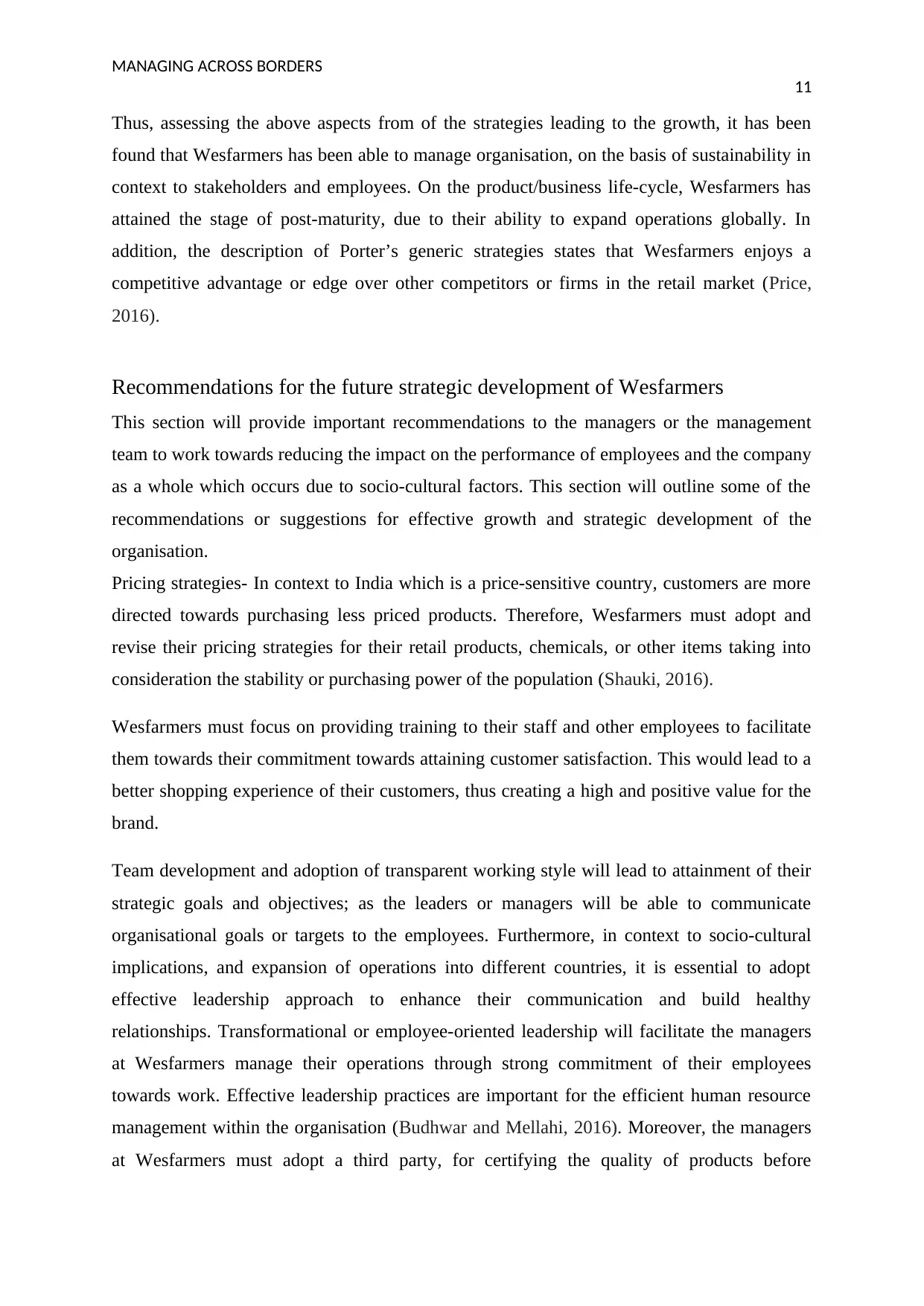
MANAGING ACROSS BORDERS
11
Thus, assessing the above aspects from of the strategies leading to the growth, it has been
found that Wesfarmers has been able to manage organisation, on the basis of sustainability in
context to stakeholders and employees. On the product/business life-cycle, Wesfarmers has
attained the stage of post-maturity, due to their ability to expand operations globally. In
addition, the description of Porter’s generic strategies states that Wesfarmers enjoys a
competitive advantage or edge over other competitors or firms in the retail market (Price,
2016).
Recommendations for the future strategic development of Wesfarmers
This section will provide important recommendations to the managers or the management
team to work towards reducing the impact on the performance of employees and the company
as a whole which occurs due to socio-cultural factors. This section will outline some of the
recommendations or suggestions for effective growth and strategic development of the
organisation.
Pricing strategies- In context to India which is a price-sensitive country, customers are more
directed towards purchasing less priced products. Therefore, Wesfarmers must adopt and
revise their pricing strategies for their retail products, chemicals, or other items taking into
consideration the stability or purchasing power of the population (Shauki, 2016).
Wesfarmers must focus on providing training to their staff and other employees to facilitate
them towards their commitment towards attaining customer satisfaction. This would lead to a
better shopping experience of their customers, thus creating a high and positive value for the
brand.
Team development and adoption of transparent working style will lead to attainment of their
strategic goals and objectives; as the leaders or managers will be able to communicate
organisational goals or targets to the employees. Furthermore, in context to socio-cultural
implications, and expansion of operations into different countries, it is essential to adopt
effective leadership approach to enhance their communication and build healthy
relationships. Transformational or employee-oriented leadership will facilitate the managers
at Wesfarmers manage their operations through strong commitment of their employees
towards work. Effective leadership practices are important for the efficient human resource
management within the organisation (Budhwar and Mellahi, 2016). Moreover, the managers
at Wesfarmers must adopt a third party, for certifying the quality of products before
11
Thus, assessing the above aspects from of the strategies leading to the growth, it has been
found that Wesfarmers has been able to manage organisation, on the basis of sustainability in
context to stakeholders and employees. On the product/business life-cycle, Wesfarmers has
attained the stage of post-maturity, due to their ability to expand operations globally. In
addition, the description of Porter’s generic strategies states that Wesfarmers enjoys a
competitive advantage or edge over other competitors or firms in the retail market (Price,
2016).
Recommendations for the future strategic development of Wesfarmers
This section will provide important recommendations to the managers or the management
team to work towards reducing the impact on the performance of employees and the company
as a whole which occurs due to socio-cultural factors. This section will outline some of the
recommendations or suggestions for effective growth and strategic development of the
organisation.
Pricing strategies- In context to India which is a price-sensitive country, customers are more
directed towards purchasing less priced products. Therefore, Wesfarmers must adopt and
revise their pricing strategies for their retail products, chemicals, or other items taking into
consideration the stability or purchasing power of the population (Shauki, 2016).
Wesfarmers must focus on providing training to their staff and other employees to facilitate
them towards their commitment towards attaining customer satisfaction. This would lead to a
better shopping experience of their customers, thus creating a high and positive value for the
brand.
Team development and adoption of transparent working style will lead to attainment of their
strategic goals and objectives; as the leaders or managers will be able to communicate
organisational goals or targets to the employees. Furthermore, in context to socio-cultural
implications, and expansion of operations into different countries, it is essential to adopt
effective leadership approach to enhance their communication and build healthy
relationships. Transformational or employee-oriented leadership will facilitate the managers
at Wesfarmers manage their operations through strong commitment of their employees
towards work. Effective leadership practices are important for the efficient human resource
management within the organisation (Budhwar and Mellahi, 2016). Moreover, the managers
at Wesfarmers must adopt a third party, for certifying the quality of products before
⊘ This is a preview!⊘
Do you want full access?
Subscribe today to unlock all pages.

Trusted by 1+ million students worldwide
1 out of 16
Related Documents
Your All-in-One AI-Powered Toolkit for Academic Success.
+13062052269
info@desklib.com
Available 24*7 on WhatsApp / Email
![[object Object]](/_next/static/media/star-bottom.7253800d.svg)
Unlock your academic potential
Copyright © 2020–2025 A2Z Services. All Rights Reserved. Developed and managed by ZUCOL.




